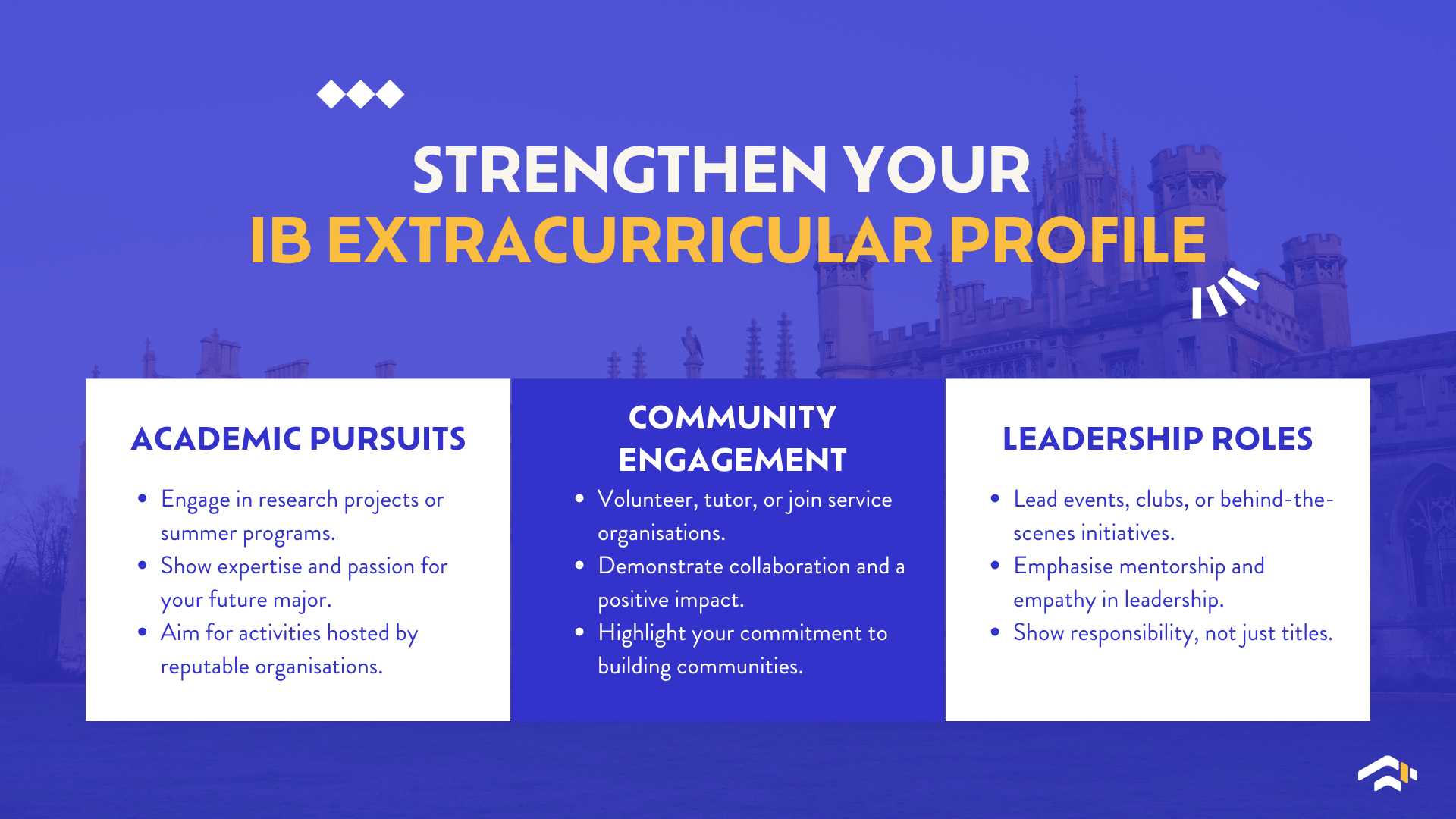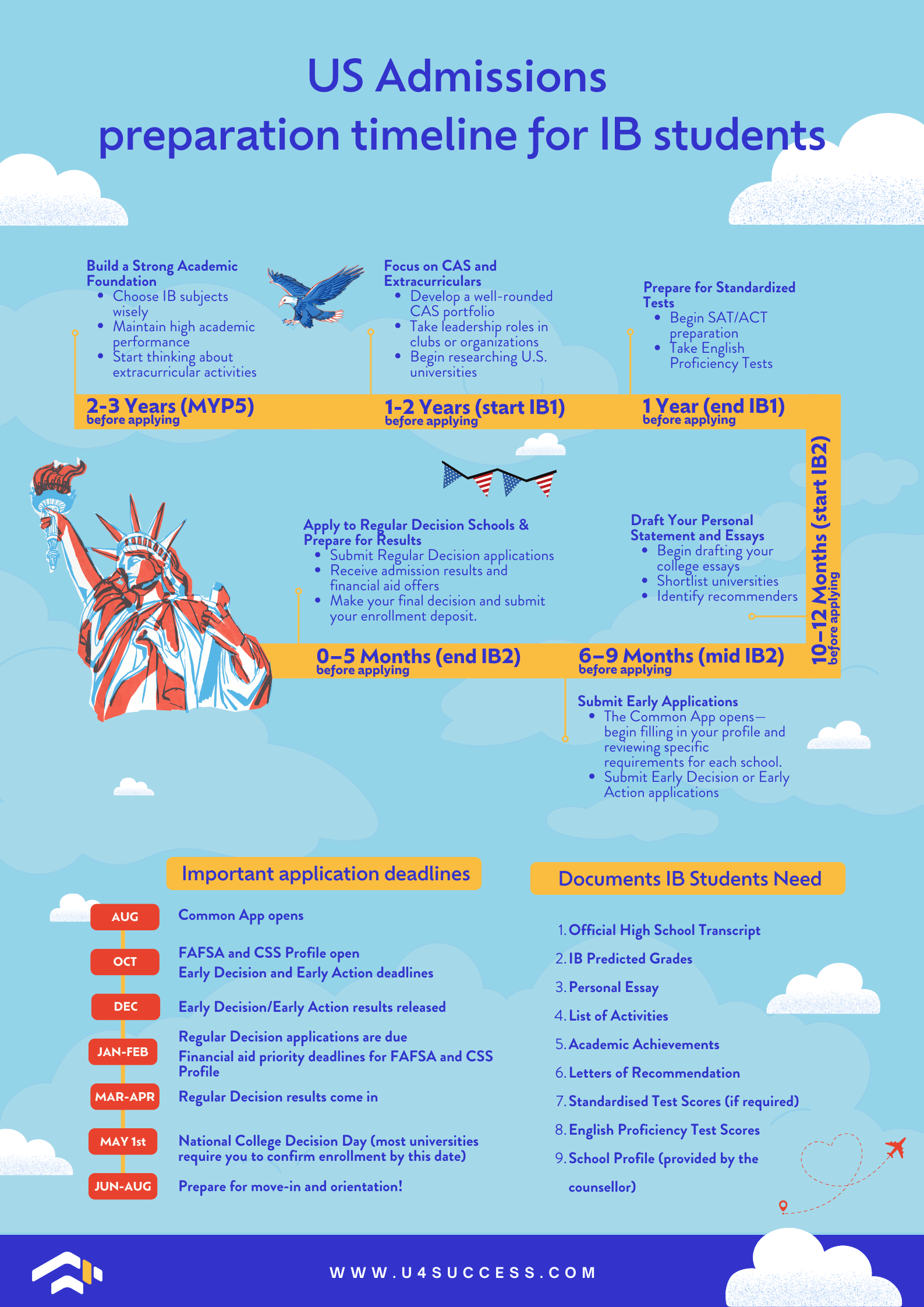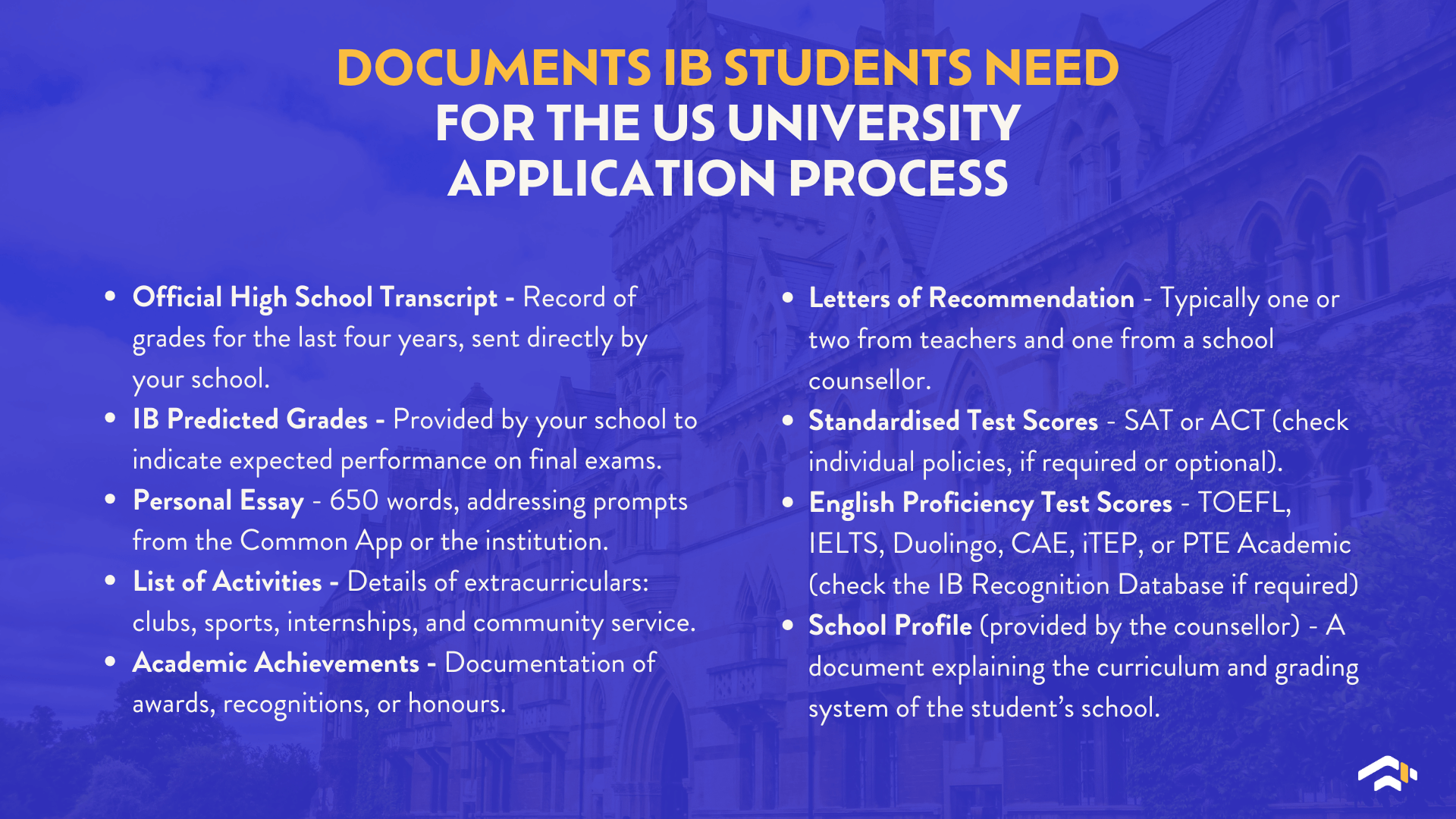Navigating US University Admissions: A Comprehensive Guide for IB Students Applying to US Universities
Written by Katerina Braga
The United States remains a top destination for International Baccalaureate students seeking world-class education. From Ivy League universities to liberal arts colleges, the opportunities for university admission in the USA for IB students are vast and diverse, aligning seamlessly with the IB programme, like a well-planned flight to success.
IB students are uniquely equipped to meet the high standards of US universities. However, navigating IB students’ college applications in the USA can feel like piloting through complex airspace. Tasks like understanding IB predicted grades, crafting compelling personal essays, and highlighting extracurricular achievements require a well-charted flight plan and careful preparation.
University admission counsellors serve as navigators for IB students and their families, planning college applications in the USA. At U4Success, we offer personalised strategies and expert advice to help IB students secure admission to top American universities. Here is a detailed navigation guide prepared by our team for IB students applying to colleges in the USA.

Table of Contents
- What is a good IB score for US universities?
- What IB Students Need for a Successful US University Application
- IB Score or SAT/ACT?
- Academic Transcripts for IB Students in US Admissions
- Beyond the Classroom: Extracurricular Activities vs CAS
- Crafting a Winning Common App Essay: Tips for IB Students
- Interview to Showcase Strong IB Student Experience
- Strong Letters of Recommendation: A Key to US College Admission
- When to Start the US University Admission Preparation Process
- How to apply to US universities with International Baccalaureate diplomas?
- Financial Support for IB Students in US Universities
- Common Mistakes in US University Applications and How to Avoid Them
- Admissions strategy
What is a good IB score for US universities?
Let’s begin with a brief overview of the top 10 US universities for 2025 (ranked by The Times Higher Education) and IB Diploma recognition in the USA.
The majority of US universities offer unique advantages to IB students. These include substituting IB scores for entrance test requirements or allowing direct entry into the second year of undergraduate studies. However, unlike UK institutions, most US universities do not explicitly state a minimum IB score.
The evaluation below is based on insights from U4Success university admission counsellors knowing a lot about IB Diploma recognition in the USA. It highlights the best universities for IB students, considering their policies and benefits for those with IB Diplomas.
TOP-10 US Colleges in 2025 for IB Students.
Free University Admissions Consultation
Ready to go from IB into a University? Book a free 20 min consultation with our IB-specialised University Admissions Counsellors. During this time, you’ll have the chance to ask our counsellors any questions about the application process in different countries, discuss your goals and explore various destinations.
What IB Students Need for a Successful US University Application
US universities use a holistic admissions process to evaluate IB students. This approach values academics, essays, interviews, extracurriculars, and leadership. Academic excellence is always central.
Different universities weigh these components differently. For IB students, IB predicted grades, academic transcripts, and occasionally but rarely, standardised test scores (such as the SAT or ACT), are critical academic factors.
Essays and interviews also play a significant role in showcasing a student’s personality and goals. Meanwhile, extracurricular activities and leadership skills demonstrate their engagement and potential.
US universities assess these elements together to get a full picture of each applicant. IB students must prepare across all areas to meet the expectations of competitive schools.
IB Score or SAT/ACT?
The SAT (Scholastic Assessment Test) and ACT (American College Testing) are standardised exams used by US colleges to evaluate applicants’ readiness for higher education. While both IB scores and SAT/ACT scores measure academic achievement, they assess different aspects.
Nevertheless, IB students are often seen as exceptional due to the depth and rigour of the IB programme. Nearly all US universities consider IB Diploma Programme (DP) performance for admissions. They also use IB scores for course credit, advanced standing, scholarships, or financial aid. However, some colleges, like Caltech, do not award IB course credits, requiring International Baccalaureate students to pass additional exams.
As mentioned earlier, US universities do not publish official IB cut-off scores. Instead, they evaluate a combination of factors, including course selection and performance, the Extended Essay, Creativity, Activity, and Service (CAS) activities, interviews or personal statements, letters of recommendation, and sometimes results from other standardised exams. Additionally, many institutions assess performance in individual IB courses rather than focusing solely on the total point score.
For IB students, acceptance rates to Ivy League schools are up to 18% higher than the general population. Top-ranked universities outside the Ivy League have even higher gaps, averaging 22%.
One key aspect of US admissions is that decisions are made before IB students take their final exams. Offers are often based partially on predicted IB scores submitted by the school. If final grades fall significantly below the predicted scores, universities may choose to withdraw their offers.
This makes it crucial for IB students to maintain consistent performance throughout their programme. Ensuring alignment between predicted and final scores is essential to secure their admission.
Academic Transcripts for IB Students in US Admissions
As we mentioned earlier, US universities want to know more about applicants than just their IB scores. This is why academic transcripts are critical for the application process.
For IB students, they serve as an official record of academic performance throughout Grades 9-12. It demonstrates achievements and highlights key aspects of their education.
US universities view transcripts as more than grades. They reveal a student’s intellectual growth and commitment to challenging coursework. Admissions officers look for patterns like steady improvement or consistent excellence.
In the IB context, Higher Level (HL) courses and core components such as the Extended Essay (EE) and Theory of Knowledge (TOK) play an essential role. They showcase critical thinking and research skills, which US universities highly value.
A well-prepared transcript highlights students’ capabilities and ensures their application stands out in competitive admissions. Many institutions accept the IB transcript as a high school completion credential. However, some may also require a separate high school diploma.
Beyond the Classroom: Extracurricular Activities vs CAS
Extracurricular activities are a cornerstone of the holistic admissions process in US universities. They reveal a student’s passions, leadership abilities, and dedication outside academics.
For IB students, the Creativity, Activity, Service (CAS) component provides a natural framework for meeting these expectations. CAS encourages involvement in creative projects, physical activities, and community service.
This aligns with US universities’ focus on well-rounded individuals who are socially responsible and academically capable. Documenting CAS projects effectively can highlight an IB student’s initiative and ability to balance academics with meaningful contributions.
While CAS can serve as a substitute for traditional extracurriculars, depth and consistency remain essential. A well-executed CAS project, such as leading a clean-up initiative or organising a cultural programme, can be as impressive as non-IB activities.

You can also find 100 unique ideas from U4Success tutors on how to organise CAS projects for IB students.
Book a free consultation today to discuss your goals and needs!
Why leave your future up for a chance? At U4Success, our expert college admission counsellors understand the nuances of every IB student’s journey to applying to US universities. Let us guide you to success in the competitive US admissions process!

The Benefits and Considerations of Applying Early to US Colleges
Applying early to US universities through Early Decision (ED) or Early Action (EA) programmes can boost your chances of acceptance, particularly at competitive institutions. These options demonstrate your commitment and enthusiasm for a specific university, which appeals to admissions committees. However, they come with unique considerations.
Early Decision (ED): A Binding Commitment
Early Decision is a binding agreement, meaning that if accepted, you are obligated to attend that university. This option is ideal for students who are 100% certain about their first-choice school.
- Advantages: Increases acceptance chances due to demonstrated interest. Decisions are released early, typically by December.
- Key Schools Offering ED: Harvard, Columbia, Duke.
Early Action (EA): Greater Flexibility
Early Action is non-binding, allowing students to apply early and receive an admissions decision without committing to attend.
- Advantages: Offers flexibility and time to weigh multiple offers.
- Key Schools Offering EA: Stanford, University of Chicago.
- Restrictive Early Action (REA): Some schools, like Stanford, limit the number of early applications you can submit.
Key Considerations for IB Students
- Preparation: Ensure all application materials—essays, IB predicted grades, and recommendations—are ready by the earlier deadlines.
- Commitment: ED decisions are binding, so apply only if you’re certain about the school.
- Flexibility: EA allows for exploring other options, making it a safer choice if you’re undecided.
Applying early can enhance your chances but requires meticulous planning and confidence in your choices. Start early, stay organised, and leverage your IB strengths to maximise success.
Plan your journey to US university success with a tailored flight plan.
It all starts with a flight plan. We work with you to select and implement the best IB programme and university admissions strategy tailored to your goals. Our expert advisors will act as navigators, guiding you seamlessly through every step of the process. Prepare for takeoff and secure your spot at a top US university.
How to apply to US universities with International Baccalaureate diplomas?
Selecting the best application method is the first step for IB students applying to US universities. With three primary pathways—Common Application, Coalition Application, and direct applications—understanding each option ensures a seamless process.
The Common Application (Common App)
The Common App is the most popular platform for US university admissions, connecting students to over 1,000 institutions. It contains application requirements, virtual tours, academic programs, testing policies and student experience on campus. The Common App simplifies the process by centralising documents such as essays, transcripts, and recommendation letters. It gathers all the information in a single space, enabling to fill out one central application that goes to multiple universities.
Many universities that accept the IB diploma are part of this system, including:
- Harvard University
- Stanford University
- New York University
- University of California, Los Angeles (UCLA)
- University of Michigan
The Common App also provides tools to help students track application deadlines and requirements, making it ideal for managing multiple submissions. Visit www.commonapp.org for more details.
The Coalition Application
The Coalition Application supports students in applying to over 150 universities. It is designed with additional resources for underrepresented students and includes a digital “locker” for storing and sharing documents.
Some universities use the Coalition Application, so verifying preferences during your research is crucial. Notable universities accepting this platform include:
- Yale University
- University of Washington
- University of Chicago
- University of Florida
- University of Maryland
For more information, explore www.coalitionforcollegeaccess.org.
Direct Applications
Direct applications require students to apply individually to universities through their official websites. Although less common, this method is mandatory for certain institutions with unique application processes.
Examples of universities requiring direct applications include:
- Georgetown University
- Massachusetts Institute of Technology (MIT)
- University of California
Direct applications often involve specific requirements, such as uploading predicted grades or supplemental essays. Students must carefully track deadlines and fulfil individual school expectations.
Your choice of application platform depends on your list of target universities and personal preferences. Centralised systems like the Common App and Coalition Application save time and simplify document submissions.

Financial Support for IB Students in US Universities
US universities offer a range of financial aid options to support international students. These include need-based assistance, merit-based scholarships, and external funding opportunities.
Need-Based Financial Aid
Prestigious institutions, including Ivy League schools, may offer need-blind admissions for international students. This ensures talented applicants can access programmes regardless of financial background. Some universities provide generous financial aid packages to cover tuition and living costs.
Merit-Based Scholarships
Merit-based scholarships reward exceptional academic performance, leadership, or unique talents. Universities, private organisations, and government programmes such as Fulbright or EducationUSA fund these scholarships. IB students, with their rigorous academic background and global perspective, are often strong contenders for these awards.
Resources Containing Information About Financial Aid for US College Applicants
- EducationUSA: A valuable resource for admissions and financial aid information for international students.
- Federal Student Aid Website: Provides comprehensive information on funding options.
- IACAC Resource Page: Includes sample financial aid forms for international applicants.
Common Mistakes in US University Applications and How to Avoid Them
Applying to US universities is exciting but challenging, especially for international students. Here are the most common mistakes and how to avoid them:
Starting Too Late
Many students underestimate the time needed to craft a strong application. Tasks like essays, recommendation letters, and preparing for tests take time.
How to Avoid It: Start at least 12-18 months before deadlines. Create a timeline with milestones to stay organised and reduce stress.
Applying to Too Many or Too Few Universities
Some International Baccalaureat students apply to too many universities without focus, while others limit their chances by applying to too few.
How to Avoid It: Build a balanced list with reach, match, and safety schools. Research to ensure each is a good academic, financial, and personal fit.
Neglecting the Essays
Essays are a crucial part of the process, but generic or poorly written responses fail to impress admissions officers.
How to Avoid It: Dedicate time to brainstorming and revising. Write authentic essays that reflect your unique experiences and align with the university’s values.
Ignoring Financial Planning
Students often misunderstand financial aid options or overlook costs, leading to difficulties later.
How to Avoid It: Research tuition, living costs, and scholarships early. Include financial safety schools and prepare a clear funding plan.
Overlooking Extracurricular Activities
Some applicants with IB diplomas focus only on academics, ignoring the importance of extracurriculars in creating a well-rounded profile.
How to Avoid It: Engage in meaningful activities that showcase leadership, passion, and impact. Highlight these experiences in your application.
Forgetting to Demonstrate Interest in Target Schools
US universities appreciate applicants who show genuine interest in their institution.
How to Avoid It: Attend virtual tours and connect with admissions representatives. Demonstrate commitment by engaging with the university.
By avoiding these pitfalls, you can submit a strong and polished application. Careful planning and attention to detail will help you maximise your chances of success in the US admissions process.

About the Author
Katerina Braga, Head of Marketing at U4Success, brings years of experience in marketing communications and PR within international companies. She is a qualified educator and the author of academic publications on history. Additionally, Katerina is a skilled trainer in communication and public speaking, helping individuals enhance their confidence and presentation abilities.
